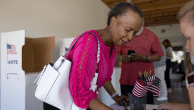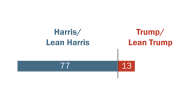Kiana Cox is a senior researcher on the Race and Ethnicity team at Pew Research Center. She leads our National Survey of Black Americans, which engages on questions of Black identity, politics, and economic mobility. She is also co-author of the Center’s groundbreaking study, “Faith Among Black Americans”. Prior to joining the Center in 2018, Kiana was an Assistant Professor of Sociology at SIU-Edwardsville where she taught courses on race, gender, Black history, social movements, statistics and research methodology. She earned her Ph.D. in sociology with a concentration in race and gender from the University of Illinois at Chicago.
Publications
- data essay
Views of Race, Policing and Black Lives Matter in the 5 Years Since George Floyd’s Killing
Americans have expressed skepticism that attention to racial issues after Floyd’s killing led to changes that improved Black people’s lives.
- short reads
On most issues, Black voters are more confident in Harris than Trump
The economy, health care, and racial and ethnic inequality are among the top issues for Black voters in the presidential election.
- short reads
Black voters support Harris over Trump and Kennedy by a wide margin
About three-quarters of Black voters (77%) say they would vote for or lean toward Harris if the 2024 presidential election were held today.
- report
Most Black Americans Believe U.S. Institutions Were Designed To Hold Black People Back
Those who experienced racial discrimination are more likely to say these institutions intentionally or negligently harm Black people.
- report
An Early Look at Black Voters’ Views on Biden, Trump and Election 2024
Black voters are more confident in Biden than Trump when it comes to having the qualities needed to serve another term.
- report
Black Americans Firmly Support Gender Equality but Are Split on Transgender and Nonbinary Issues
Nearly six-in-ten want organizations working for Black progress to address the distinct challenges facing Black LGBTQ people. Black Americans are more likely to know someone who is transgender or nonbinary than to identify as such themselves.
- short reads
For Black History Month, a look at what Black Americans say is needed to overcome racial inequality
Most Black adults (63%) say voting is an extremely or very effective strategy for Black progress; only 42% say the same of protesting.
- short reads
Black and White Americans are far apart in their views of reparations for slavery
Overall, 30% of U.S. adults say descendants of people enslaved in the U.S. should be repaid in some way. 68% say they should not be repaid.
- short reads
10 facts about Black Republicans
Black Republicans tend to support individualistic approaches to addressing racial inequality, while Black Democrats back institutional approaches.
- report
Black Americans Have a Clear Vision for Reducing Racism but Little Hope It Will Happen
Black Americans support significant reforms to or complete overhauls of several U.S. institutions to ensure fair treatment. Yet even as they assess inequality and ideas about progress, many are pessimistic about whether society and institutions will change in ways that would reduce racism.










